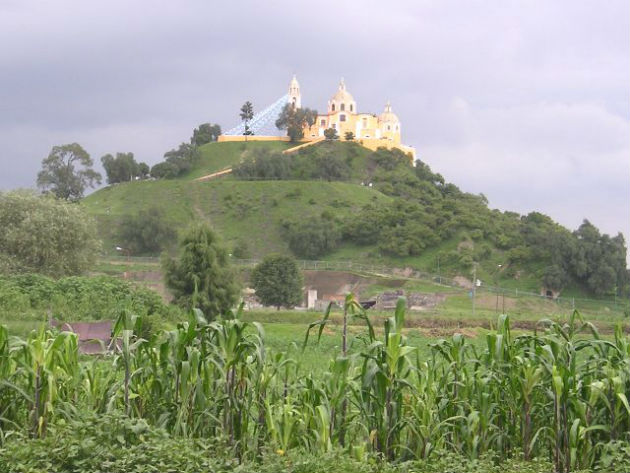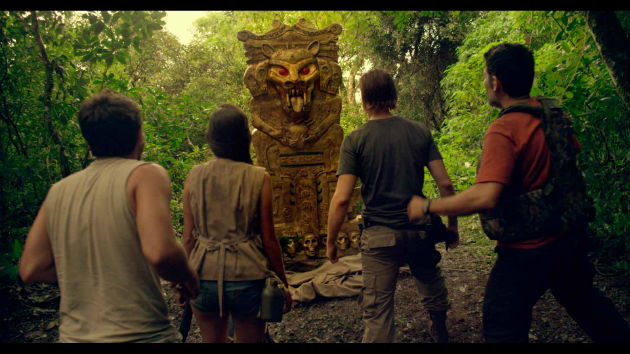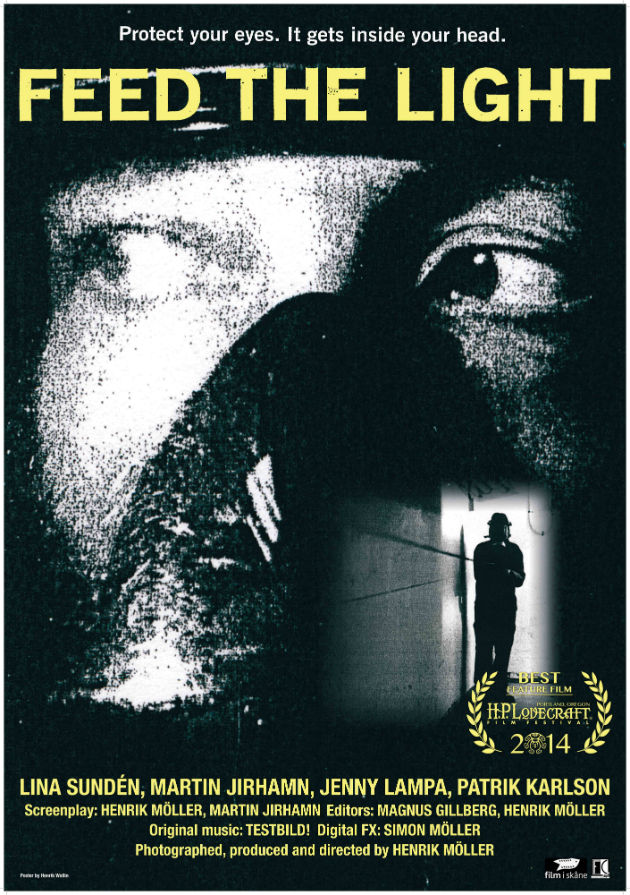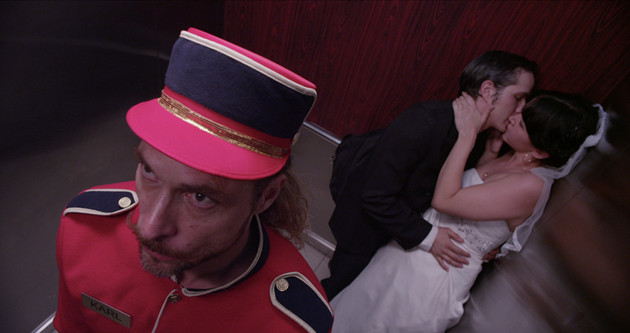Morbido Fest 2014, Dispatch 1: FEED THE LIGHT, EL INCIDENTE, And TEKUANI Explore Limits Of The Human Psyche
"We're under the volcano," said filmmaker Richard Stanley, referring to the novel by Malcolm Lowry, adapted for the screen by John Huston in 1984, and the location of the Morbido Film Festival in 2014.
The tops of volcanoes were enshrouded in clouds on my second day in Puebla, Mexico, but otherwise it was a beautiful, temperate day as the Morbido Fest began its first full day of screenings. I saw a Mexican adventure that recalled, at times, The Treasure of the Sierra Madre, followed by my first black-and-white Swedish film with Spanish subtitles, and concluded with the post-midnight adventure into bizarre yet compelling drama from a Mexican filmmaker.
Oh, and a mid-screening interruption by the Department of Safety! The day started, though, with a trip to a pyramid.




Pyramid, Oh Pyramid
A number of guests were privileged to take a day trip to see a pyramid. Not just any pyramid, though. According to Wikipedia:
"The Great Pyramid of Cholula, also known as Tlachihualtepetl (Nahuatl for "artificial mountain"), is a huge complex located in Cholula, Puebla, Mexico. It is the largest archaeological site of a pyramid (temple) in the New World. The pyramid stands 55 metres (180 ft) above the surrounding plain,[2] and in its final form it measured 400 by 400 metres (1,300 by 1,300 ft).[3] The pyramid is a temple that traditionally has been viewed as having been dedicated to the god Quetzalcoatl."
Going into further detail would derail this post further, but what really came home to me was the desire of the Morbido festival organizers to give visiting filmmakers and other guests a chance to visit, get to know one another better, and also learn more about local culture.
As I noted about the opening ceremony, while some of the films may be familiar titles from other, earlier festival appearances, the context in which they are presented as part of the Morbido fest is an important component explaining why it's unique and very special.
TEKUANI: THE GOLDEN GOD
directed by Sergio Sanchez Suarez
Three friends who work together as independent rescue workers are having a rough go of it. They help people who are trapped underground or in remote regions of the country, and their reward is often no more than a chicken or turkey.
Carlos is a family man, and he's beginning to buckle under the financial pressure, so when they arrive in a dense forest where a woman wants them to find her brother, a guide who took a group out on a trip, it's a job that seems doomed to failure. But after the woman assures them that the group has big bucks, Carlos pushes his friends Adolfo and George into accepting, with the idea that they'll be ruthless and extort as much money from the group as possible.
It turns out that finding the group is easy, except that they'll add dead. All but the woman's brother, which is when the film takes a turn that is revelatory about the woman's character. The men decide to ransack the camp for whatever goods they can recover, and that's when the discover the titular idol, a huge monstrosity that they reckon is worth millions. Naturally, they want to take it with them, a herculean task that is soon made incredibly dangerous.
The story echoes John Huston's The Treasure of the Sierra Madre to a greater degree when one of the men turns particularly savage toward his friends. From there it becomes a question of who survive, and how.
Sergio Sanchez Suarez, who wrote and directed, comes up with several good twists that keep the proceedings happily off-balance. The pace is a bit torpid, and the original musical score is sometimes at odds with the action, but the film comes across as a modest success, built on an evident desire to make a psychological drama with supernatural overtones.
Full disclosure: For this Spanish-language film with portions of dialogue in English, I missed perhaps 15-20% of the dialogue -- my comprehension of Spanish is not so good -- but I feel like I got the gist of the conversations and story, though I know I missed some of the humor and possibly other plot points, judging by the reaction of the audience.
FEED THE LIGHT
Directed by Henrik Moller
Ah, nothing like a black-and-white movie in Swedish with Spanish subtitles!
My limitations in comprehending Spanish were less of an issue with this terrific, dreamy picture, since there was less dialogue than usual and it's easier for me to read Spanish than understand this beautiful language when it's spoken. In any event, the images that Moller created on a tiny budget were so compelling that I was completely caught up with the movie, even when a woman from the Department of Safety entered the theater, the lights came up, and she said something about a ten-minute delay. Or was it that they were jumping ahead in the movie, or something else?
I don't know, exactly, but frankly I don't care. The movie never stopped playing, and by that point I was more than sufficiently intrigued that I could ignore the distractions. Drawing inspiration from the work of H.P. Lovecraft, the story follows Lina (Sara Hansson) as she takes a job as a janitor at a mysterious institution located underground. But her real motive is to find her daughter, who went missing, as did her husband. I missed the point about how she knew where to look, but the hypnotic movie follows dream logic, and very quickly I threw out most of my narrative preconceptions.
The world that Lina enters consists of long hallways and tiny offices and cramped rooms. When she interviews for the job with the boss (Jenny Lampa), a naked man cowers nearby, behaving like a dog for no apparent reason. When Lina secures the job after a cursory interview, she is met by a menacing man who glares at her and speaks in non sequiturs and threats. She is barely "on the job" when she finds her husband, who speaks of things that don't entirely make sense, but he, along with yet another man, come to her aid in finding the missing little.
There are hints of David Lynch -- it's impossible to avoid comparisons with the black-and-white imagery of Eraserhead -- but Moller is more interested in Lina as a very determined mother who will do anything to get her child back, no matter the nightmares she must endure.
Moller wields an impressive array of shot selections, never quite exhausting the possibilities of the looming hallways, and a rather fantastic "creature" that is shadowy and indistinct and, frankly, quite creepy and unsettling. This is the type of movie that inspired the cliche, "It's not for everyone," but anyone who is open to a hypnotic, dreamy experience powered by a strong motivation should seek it out.
EL INCIDENTE (THE INCIDENT
Directed by Isaac Ezban
A lively crowd buzzed into the theater for the 12:30 a.m. (?!) screening -- half past midnight! I'm really getting old -- for a Mexican film (with English subtitles) that has been making the festival rounds.
After a brief preamble of strikingly different images -- an elderly woman stretched out on an escalator, a newly-married couple romping through a hotel lobby -- the action begins with two brothers and a cop in a tense stand-off that leads to bloody violence. It takes place in an apartment building, and the trio end up in the stairway -- a stairway that must have been designed by M.C. Escher, because it's infinite. With no way out, the tension rises to unrelieved agony. Just when it seems there is no where else to go in the story, writer/director Isaac Esban switches to another story that may or may not have anything to do with the first one.
Our own Eric Ortiz Garcia saw the film earlier this year, and in his review, he wrote in part:
"It's easy to connect with this kind of thought as life works in mysterious ways and sometimes you can recognize and appreciate a certain moment until it's long gone. In The Incident, however, things work in an even weirder way and what the characters pass along will eventually return over and over again."
…
"Though it's never plain in terms of storytelling, it will be difficult to find each and every idea conceivable. Still, and as a whole, The Incident is bright and concise, perfectly expressing its director's (very human) concerns while also offering an exciting "alternate" world. Ezban is worried about aging and The Incident leaves a bleak feeling towards something as inevitable as that."
You can read Eric's entire review here. I find myself in agreement with all the points he makes, though I confess that the long day and the later hour made the final chapter of the film even more of a mind-blower than it might have been if I was entirely awake.
Still, a fitting conclusion to a great day at Morbido Film Fest.

More about The Incident (2014)
- Review: THE INCIDENT, Isaac Ezban's Fascinating Debut Feature
- Fantaspoa 2015 Dispatch: Award Winners Include STUNG And THE INCIDENT
- Fantaspoa Reveals Full 2015 Lineup
- Fantaspoa 2015: First Wave Of Films Includes SCHERZO DIABOLICO, TURBO KID And More!
- Eric Ortiz Garcia Picks The Best And Worst Mexican Cinema Of 2014
More about Feed The Light
More about Tekuani: The Golden God
Around the Internet
Recent Posts
Leading Voices in Global Cinema
- Peter Martin, Dallas, Texas
- Managing Editor
- Andrew Mack, Toronto, Canada
- Editor, News
- Ard Vijn, Rotterdam, The Netherlands
- Editor, Europe
- Benjamin Umstead, Los Angeles, California
- Editor, U.S.
- J Hurtado, Dallas, Texas
- Editor, U.S.
- James Marsh, Hong Kong, China
- Editor, Asia
- Michele "Izzy" Galgana, New England
- Editor, U.S.
- Ryland Aldrich, Los Angeles, California
- Editor, Festivals
- Shelagh Rowan-Legg
- Editor, Canada










